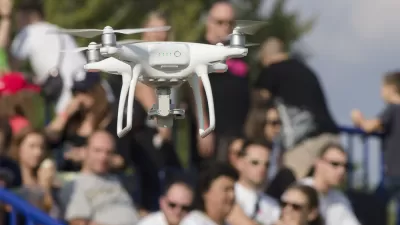A Google-backed proposal to turn an underused section of Toronto waterfront into a tech hub holds relevant lessons about privacy and data.

Five years after the failure of Google-affiliated Sidewalk Labs’ proposal to build a hyperconnected, tech-forward planned community in Toronto, Stephen Goldsmith reflects on the lessons that planners learned — and forgot — from the experiment.
For Goldsmith, the project created questions about privacy, digitally connected cities, and data handling. “If anything, the landscape has only gotten more complex, dispersed and high-stakes.”
New mobility services, connected vehicles and on-demand deliveries track the movements of people and goods across cities. An explosion of video cameras, license plate readers, drones and biometric tools monitor public spaces and promise better safety and enforcement. Sensor networks optimize services by capturing endless data streams on peoples’ health, energy use, parking and more.
Goldsmith argues that, while there is a net benefit to the growth of this technology, civic leaders must take proactive steps to protect citizens’ privacy and understand how data is being captured, monitored, and used. Cities must also “set clear policies for external partners” and offer complete transparency around data collection.
For Goldsmith, “When it comes to balancing technology’s benefits and risks in urban environments, the story is just getting started, and local leaders need to keep up with it.”
FULL STORY: Lessons From a Failed Tech Urbanist Dream

Planetizen Federal Action Tracker
A weekly monitor of how Trump’s orders and actions are impacting planners and planning in America.

Congressman Proposes Bill to Rename DC Metro “Trump Train”
The Make Autorail Great Again Act would withhold federal funding to the system until the Washington Metropolitan Area Transit Authority (WMATA), rebrands as the Washington Metropolitan Authority for Greater Access (WMAGA).

DARTSpace Platform Streamlines Dallas TOD Application Process
The Dallas transit agency hopes a shorter permitting timeline will boost transit-oriented development around rail stations.

Supreme Court Ruling in Pipeline Case Guts Federal Environmental Law
The decision limits the scope of a federal law that mandates extensive environmental impact reviews of energy, infrastructure, and transportation projects.

Texas State Bills to Defund Dallas Transit Die
DART would have seen a 30% service cut, $230M annual losses had the bills survived.

Bikeshare for the Win: Team Pedals to London Cricket Match, Beats Rivals Stuck in Traffic
While their opponents sat in gridlock, England's national cricket team hopped Lime bikes, riding to a 3-0 victory.
Urban Design for Planners 1: Software Tools
This six-course series explores essential urban design concepts using open source software and equips planners with the tools they need to participate fully in the urban design process.
Planning for Universal Design
Learn the tools for implementing Universal Design in planning regulations.
Roanoke Valley-Alleghany Regional Commission
City of Mt Shasta
City of Camden Redevelopment Agency
City of Astoria
Transportation Research & Education Center (TREC) at Portland State University
US High Speed Rail Association
City of Camden Redevelopment Agency
Municipality of Princeton (NJ)




























